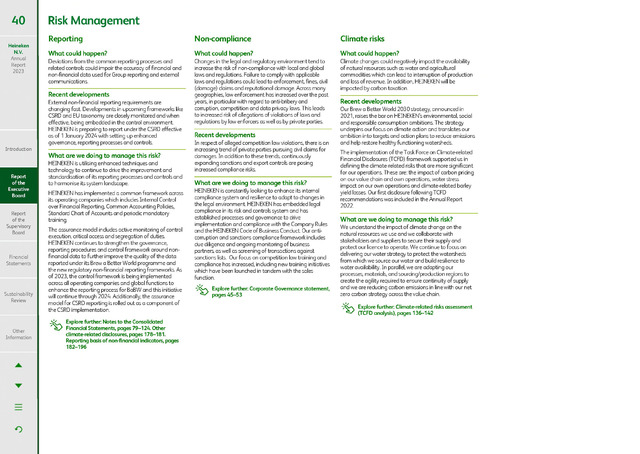Risk Management
40
Non-compliance
Climate risks
Reporting
Introduction
Sustainability
Review
Other
Information
Financial
Statements
Report
of the
Supervisory
Board
Report
of the
Executive
Board
What could happen?
Deviations from the common reporting processes and
related controls could impair the accuracy of financial and
non-financial data used for Group reporting and external
communications.
What are we doing to manage this risk?
HEINEKEN is constantly looking to enhance its internal
compliance system and resilience to adapt to changes in
the legal environment. HEINEKEN has embedded legal
compliance in its risk and controls system and has
established processes and governance to drive
implementation and compliance with the Company Rules
and the HEINEKEN Code of Business Conduct. Our anti
corruption and sanctions compliance framework includes
due diligence and ongoing monitoring of business
partners, as well as screening of transactions against
sanctions lists. Our focus on competition law training and
compliance has increased, including new training initiatives
which have been launched in tandem with the sales
function.
What could happen?
Changes in the legal and regulatory environment tend to
increase the risk of non-compliance with local and global
laws and regulations. Failure to comply with applicable
laws and regulations could lead to enforcement, fines, civil
(damage) claims and reputational damage. Across many
geographies, law enforcement has increased over the past
years, in particular with regard to anti-bribery and
corruption, competition and data privacy laws. This leads
to increased risk of allegations of violations of laws and
regulations by law enforcers as well as by private parties.
Explore further: Corporate Governance statement,
pages 45-53
What could happen?
Climate changes could negatively impact the availability
of natural resources such as water and agricultural
commodities which can lead to interruption of production
and loss of revenue. In addition, HEINEKEN will be
impacted by carbon taxation.
Explore further: Climate-related risks assessment
(tCfD analysis), pages 136-142
Heineken
N.V.
Annual
Report
2023
Explore further: Notes to the Consolidated
Financial Statements, pages 79-124. Other
climate-related disclosures, pages 178-181.
Reporting basis of non-financial indicators, pages
182-196
Recent developments
External non-financial reporting requirements are
changing fast. Developments in upcoming frameworks like
CSRD and EU taxonomy are closely monitored and when
effective, being embedded in the control environment.
HEINEKEN is preparing to report under the CSRD effective
as of 1 January 2024 with setting up enhanced
governance, reporting processes and controls.
What are we doing to manage this risk?
We understand the impact of climate change on the
natural resources we use and we collaborate with
stakeholders and suppliers to secure their supply and
protect our licence to operate. We continue to focus on
delivering our water strategy to protect the watersheds
from which we source our water and build resilience to
water availability. In parallel, we are adapting our
processes, materials, and sourcing/production regions to
create the agility required to ensure continuity of supply
and we are reducing carbon emissions in line with our net
zero carbon strategy across the value chain.
Recent developments
In respect of alleged competition law violations, there is an
increasing trend of private parties pursuing civil claims for
damages. In addition to these trends, continuously
expanding sanctions and export controls are posing
increased compliance risks.
What are we doing to manage this risk?
HEINEKEN is utilising enhanced techniques and
technology to continue to drive the improvement and
standardisation of its reporting processes and controls and
to harmonise its system landscape.
HEINEKEN has implemented a common framework across
its operating companies which includes Internal Control
over Financial Reporting, Common Accounting Policies,
Standard Chart of Accounts and periodic mandatory
training.
The assurance model includes active monitoring of control
execution, critical access and segregation of duties.
HEINEKEN continues to strengthen the governance,
reporting procedures and control framework around non-
financial data to further improve the quality of the data
reported under its Brew a Better World programme and
the new regulatory non-financial reporting frameworks. As
of 2023, the control framework is being implemented
across all operating companies and global functions to
enhance the reporting process for BaBW and this initiative
will continue through 2024. Additionally, the assurance
model for CSRD reporting is rolled out as a component of
the CSRD implementation.
Recent developments
Our Brew a Better World 2030 strategy, announced in
2021raises the bar on HEINEKEN’s environmental, social
and responsible consumption ambitions. The strategy
underpins our focus on climate action and translates our
ambition into targets and action plans to reduce emissions
and help restore healthy functioning watersheds.
The implementation of the Task Force on Climate-related
Financial Disclosures (TCFD) framework supported us in
defining the climate-related risks that are more significant
for our operations. These are: the impact of carbon pricing
on our value chain and own operations, water stress
impact on our own operations and climate-related barley
yield losses. Our first disclosure following TCFD
recommendations was included in the Annual Report
2022.

